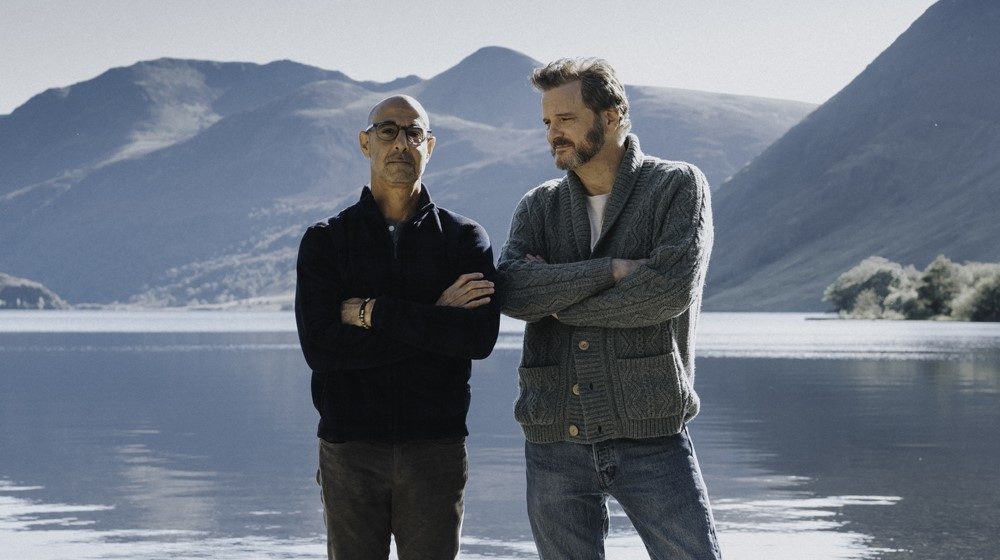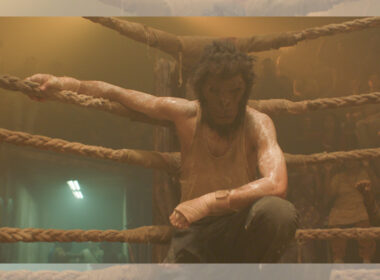Rating: ****
Halfway through Supernova, you realise that living is scarier than dying. Such a paradox isn’t as intelligent and profound as it sounds – but the film accomplishes this by grounding it all in a beautiful and pure truth. That’s how Supernova works; it avoids being cheesy by making it sincere.
It all starts with the beginning of the end. Sam (Colin Firth) drives his husband Tusker (Stanley Tucci) through the British countryside one last time before the latter succumbs to dementia. We meet them for the first time as they have a little squabble in the car; not unlike the type of trivial dispute old partners have that serves primarily to break tension. It means nothing, and yet it says more about their relationship than any convoluted exposition could. Nothing says commitment like a healthy spat about which radio station to choose.
Tusker is the lively one. A spirited American writer who gives speeches, who charms even the waitresses in the cafe with a familiarity very uncharacteristic to the Brits. Sam, a retired concert pianist, is the stern one, so, fortunately, the burden of surviving lies with him. The two men reminisce on the life they spent together – that is, in the end, part of the reason for the trip. The other part is to drive Sam to one last concert he’s no doubt playing to appease his dying partner. It serves as an excuse to visit friends one last time while Tusker can still be himself, to spend a night by the lake, remember how they fell in love, and to have that unavoidable talk no partner wants to have.
This is only the second picture from British actor and filmmaker Harry McQueen; and I wonder how hard it must’ve been to write and direct two of the best living actors when you’re still a young actor yourself. He is only ten days younger than me, and I can’t fathom being the boss of my icons so early in my career. It takes guts, but maybe that’s why they are so perfect in this – only someone with the utmost respect could let them go unrestrained. Because of that, we get this natural and expressive performance.
McQueen is a good director. Part of that dying breed that is so effective without a lot of pomp and circumstance. He knows where to put the camera so it doesn’t interfere with the scene’s emotion. It looks easy, but it’s not, and it only works when you have a good cast that carries your story. As if both sides trust each other. It’s not cinema verité. It’s truthful cinema.
Tucci and Firth masterfully deliver Sam and Tusker. There are little details in their performances that may only be appreciated after several viewings. Little nods or quirks that could only come from two people who know each other inside and out. The way they say each other’s names. The way they constantly work to be one step ahead of each other.
But it’s Tucci who has the most to offer. Of course, his character dwells with a complex internal problem no one deserves to face. In a seminal moment, while Sam goes through his personal belongings, Tusker has a heart-to-heart with his sister-in-law and points out “you’re not supposed to mourn someone while they’re still alive”. He means it with the bluntness of someone who has accepted what’s to come. A cousin of mine dealt with his wife’s slow death, and I remember seeing her one day at a party already so discouraged, so tired of all the gloom and suffering around her that she couldn’t even draw one smile around her little girl. Tusker fears reaching that point more than anything.
In an earlier scene, Tusker prepares a speech for all his friends gathered for dinner. After a couple of botched attempts, he gives up and asks Sam to read his own words for everyone. It reminded me of that scene from the Robert Ebert documentary Life Itself where his wife Chaz has to read his own words to an audience, with him by her side. It’s a beautiful moment just like this one.
Supernova is a sad film that will leave you happy. After a big revelation in the middle of the film, they avoid addressing the inevitable giant elephant in the room that, when it comes, serves as both the climax and resolution. There is no epilogue or big payoff for the characters, only a humble piano concerto. Perhaps it’s the one thing the film lacks – a big dramatic moment that shakes us back to the reality of the condition that Tusker suffers from, but maybe that omission is precisely the point. If Tusker was real, and he might as well be, we would like to have the last memory for him to be this glorious moment of unquestionable love filled with the quirks and winks that characterise him. Like a supernova, a star that shines brighter before it withers.




